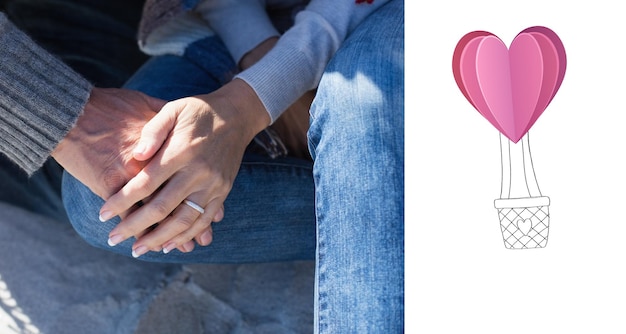The heart’s journey through the labyrinth of romantic feelings is a topic that has captivated humans for millennia. As we explore the intricate dance between love and infatuation, we’ll uncover the subtle nuances that distinguish these powerful emotional states. Along the way, we’ll discover how understanding these differences can lead to more fulfilling relationships and personal growth.
The Intricacies of Romantic Attachment
When it comes to matters of the heart, the line between love and infatuation can often blur, leaving many wondering if what they’re experiencing is fleeting or enduring. To truly grasp the nature of these emotions, we must first define them and examine their psychological foundations.
Love, in its purest form, is a deep, abiding affection that grows over time. It’s characterised by mutual respect, trust, and a willingness to accept another person wholly, flaws and all. Infatuation, on the other hand, is an intense, often short-lived passion that can be all-consuming and overwhelming.
Psychologically, both love and infatuation activate similar areas of the brain, which explains why they can feel so similar. However, the underlying processes and long-term effects differ significantly. Love tends to foster personal growth and emotional stability, while infatuation can lead to emotional turbulence and, at times, unrealistic expectations.
One common misconception is that the intensity of feeling directly correlates with its authenticity or longevity. Many believe that if they’re not constantly swept off their feet, they’re not truly in love. This misunderstanding can lead to disappointment and relationship instability.
For instance, consider Sarah, a small business owner who found herself struggling to manage her company’s administrative tasks while also trying to grow her client base. She initially mistook her intense feelings of relief and gratitude towards her new virtual assistant for a deeper connection. However, as time passed, she realised that what she felt was appreciation for the professional support, rather than romantic love. This experience helped Sarah better understand the difference between intense, short-term emotions and enduring, meaningful relationships in both her personal and professional life.
Infatuation: A Whirlwind of Emotions
Infatuation is often described as a rollercoaster of emotions, characterised by intense highs and lows. When infatuated, one might experience:
1. An all-consuming preoccupation with the object of affection
2. Idealisation of the other person, often overlooking their flaws
3. A tendency to disregard potential warning signs or incompatibilities
The brain chemistry during infatuation is similar to that experienced during a drug high. Dopamine and norepinephrine levels surge, creating feelings of euphoria and excitement. This chemical cocktail can be so potent that it mimics the sensations associated with true love, making it difficult to distinguish between the two.
While infatuation can be exhilarating, acting on these intense feelings without careful consideration can lead to impulsive decisions and potential heartbreak. It’s crucial to take a step back and evaluate the situation objectively before making significant life changes based on infatuation alone.
Take the case of Tom, a marketing executive who became infatuated with the idea of outsourcing his company’s content creation. In his excitement, he quickly signed a contract with an overseas firm without thoroughly vetting their capabilities. The initial thrill of potential time savings and cost reduction blinded him to some red flags in the provider’s portfolio. This experience taught Tom the importance of tempering enthusiasm with careful consideration in both his professional and personal decision-making processes.
Love: A Deep and Enduring Connection
Unlike the fleeting nature of infatuation, genuine love is characterised by a deep, enduring connection that withstands the test of time. Some hallmarks of true love include:
1. Mutual respect and trust between partners
2. Acceptance of each other’s flaws and differences
3. A commitment to work through challenges together
Love evolves over time, transitioning from the initial spark of attraction to a more stable, comfortable bond. This evolution doesn’t mean the relationship becomes boring; rather, it deepens and becomes more meaningful as partners grow together.
Healthy love fosters personal growth and well-being. Partners in loving relationships often report feeling more secure, confident, and supported in pursuing their individual goals. This mutual support creates a positive feedback loop, strengthening the relationship further.
Communication plays a crucial role in nurturing loving relationships. Open, honest dialogue helps partners understand each other better, resolve conflicts, and maintain a strong emotional connection.
Consider the experience of Emma, a freelance graphic designer who initially outsourced her bookkeeping out of necessity. Over time, she developed a strong working relationship with her virtual accountant, Maria. Their professional bond, built on trust, open communication, and mutual respect, allowed Emma to focus on her creative work while feeling secure about her financial management. This partnership demonstrated how a deep, enduring professional connection can mirror the qualities of a loving personal relationship, bringing stability and growth to both parties involved.
Distinguishing Between Love and Infatuation
While love and infatuation may feel similar in the early stages, there are key differences in how they manifest and affect our lives. Love tends to be more stable and less volatile than infatuation. It’s characterised by a desire to see the other person happy and fulfilled, even if that means making sacrifices.
Behavioural patterns also differ. Infatuation often leads to obsessive thoughts and actions, while love promotes a healthier balance between the relationship and other aspects of life. In love, partners maintain their individual identities and independence while growing together.
The long-term outcomes of love and infatuation vary significantly. Love tends to lead to lasting happiness and personal growth, while infatuation, if not developed into something deeper, can result in disappointment and emotional turmoil.
James, a small business owner, experienced this distinction when he hired a virtual assistant. Initially, he was infatuated with the idea of having someone handle all his administrative tasks, imagining a perfect solution to his time management issues. However, as he worked with his VA over time, he developed a more realistic appreciation for their professional relationship. This transition from infatuation to a stable, productive partnership mirrored the journey from infatuation to love in personal relationships, teaching James valuable lessons about managing expectations and fostering long-term professional connections.
Navigating the Transition from Infatuation to Love
The journey from infatuation to love is not always smooth, but it can be incredibly rewarding. Recognising the signs of deepening attachment is crucial. These may include feeling comfortable being vulnerable with your partner, supporting each other’s individual growth, and facing challenges together as a team.
Cultivating a healthy, lasting relationship requires effort from both parties. This involves maintaining open communication, showing appreciation for each other, and continually working on personal growth.
Obstacles are inevitable in any relationship. Overcoming these hurdles together can strengthen the bond between partners and help transition from infatuation to love. It’s important to approach challenges with patience, understanding, and a willingness to compromise.
Self-awareness plays a significant role in romantic development. Understanding your own needs, values, and patterns in relationships can help you make better choices and foster healthier connections.
In the business world, Lisa, a startup founder, experienced a similar transition with her outsourced customer service team. Initially enamoured with the idea of 24/7 support, she soon realised that building a lasting, effective partnership required ongoing communication, mutual understanding, and a willingness to adapt. By fostering these qualities, Lisa developed a strong, enduring relationship with her outsourced team, mirroring the transition from infatuation to love in personal relationships.
When Infatuation Doesn’t Lead to Love
Not all instances of infatuation evolve into love, and that’s perfectly normal. Coping with unrequited feelings can be challenging, but it’s an important part of emotional growth. It’s crucial to allow yourself time to process these emotions and seek support from friends, family, or professionals if needed.
Even when infatuation doesn’t lead to a lasting relationship, the experience can provide valuable insights. It can help you understand your own desires, boundaries, and what you’re looking for in a partner.
Moving on from intense attraction requires emotional resilience. Focus on self-care, pursue personal interests, and remain open to new connections. Remember that each experience, whether it leads to love or not, contributes to your personal growth and understanding of relationships.
David, a marketing manager, learned this lesson when his initial excitement about an AI-powered content creation tool didn’t translate into long-term satisfaction. While the tool seemed promising at first, he realised it couldn’t fully replace the nuanced understanding of his brand that a human writer could provide. This experience taught David to approach new business solutions with a balanced perspective, much like navigating the waters of romantic attachments.
The Cultural Context of Love and Infatuation
Our understanding and expression of love and infatuation are significantly influenced by societal norms and cultural backgrounds. Different cultures may prioritise various aspects of relationships, such as family approval, individual choice, or long-term commitment.
Cross-cultural perspectives on romantic attachment can vary widely. Some cultures may view passionate, infatuation-like love as the ideal, while others may prioritise companionate love based on friendship and mutual respect.
Media and popular culture play a significant role in shaping our expectations of romance. Films, books, and social media often portray idealised versions of love and relationships, which can lead to unrealistic expectations in real life.
Rachel, an entrepreneur who decided to outsource her company’s HR functions, found that cultural differences played a significant role in her relationship with the overseas firm she partnered with. Initially infatuated with the idea of cost savings, she soon realised that building a successful long-term partnership required understanding and adapting to different cultural perspectives on work relationships. This experience mirrored the challenges and rewards of navigating cross-cultural romantic relationships, teaching Rachel valuable lessons about communication and mutual understanding in both her personal and professional life.
Conclusion: Embracing the Complexity of Human Emotions
Both love and infatuation have their place in the tapestry of human experience. While infatuation can provide excitement and motivation, love offers depth, stability, and personal growth. Recognising the value of both can lead to a richer emotional life.
Developing emotional intelligence is key to navigating romantic pursuits successfully. This involves understanding your own emotions, recognising them in others, and responding appropriately. With practice, you can become more adept at distinguishing between fleeting infatuation and enduring love.
Ultimately, finding balance in romantic relationships is about embracing the complexity of human emotions. It’s about enjoying the thrill of new connections while also valuing the depth and stability of long-term love. By understanding the nuances of love and infatuation, we can build more fulfilling relationships and lead more emotionally satisfying lives.
In the world of business, this balance is equally important. Just as in romantic relationships, professional partnerships benefit from a combination of initial excitement and long-term commitment. Whether it’s outsourcing administrative tasks, collaborating with remote teams, or adopting new technologies, approaching these relationships with a blend of enthusiasm and realistic expectations can lead to more successful, enduring partnerships. By applying the lessons learned from understanding love and infatuation, we can navigate both our personal and professional relationships with greater wisdom and satisfaction.



